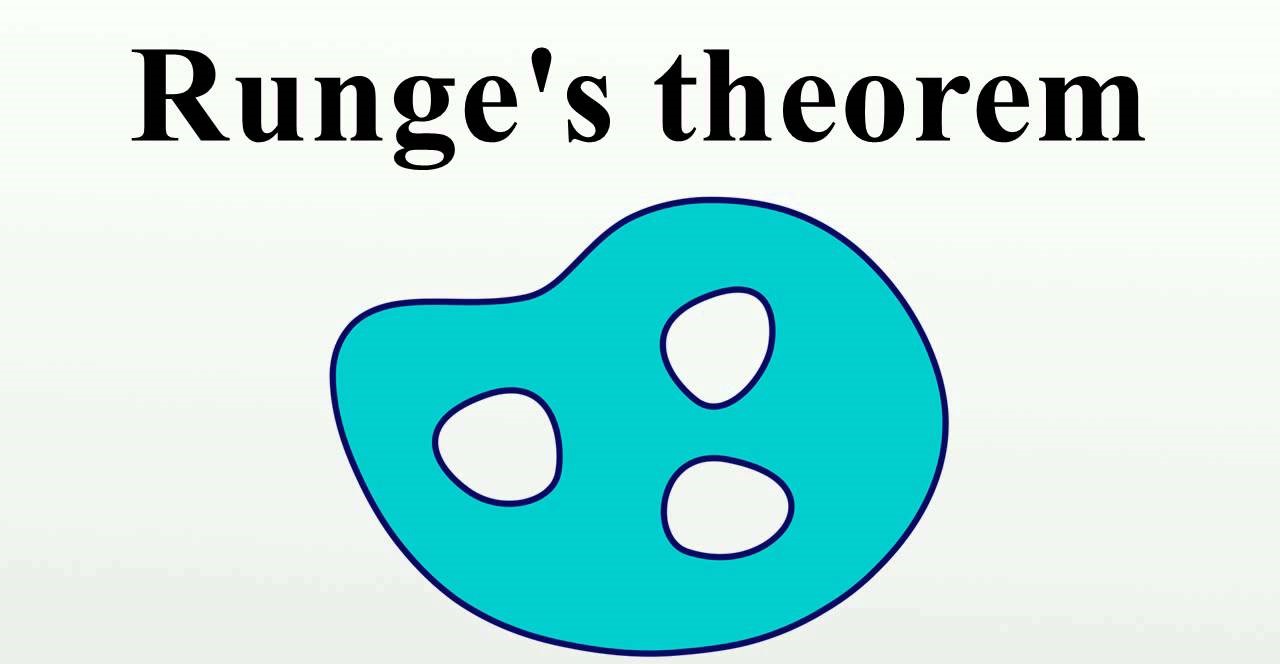
Runge's Theorem, a fundamental concept in complex analysis, holds significant importance in the field of mathematics. Understanding its principles and implications can provide valuable insights into the behavior of complex functions and their approximation. Here are eight essential facts about Runge's Theorem that shed light on its significance and applications. Whether you're a mathematics enthusiast, a student, or a professional in the field, delving into these facts will deepen your understanding of this pivotal theorem and its far-reaching impact. Let's embark on a journey to unravel the intricacies of Runge's Theorem and explore its relevance in the realm of mathematical sciences.
Key Takeaways:
- Runge’s Theorem, formulated by Carl David Tolmé Runge in 1885, helps us approximate complex functions using simpler rational functions, which is super important in fields like engineering and computer science.
- This theorem has inspired lots of cool research in math and has practical applications in control theory and signal processing, making it a big deal in the world of numbers and equations.
Runge's Theorem is a fundamental concept in complex analysis.
Runge's Theorem is a fundamental result in complex analysis that has far-reaching implications in the field of mathematics. It provides a powerful tool for approximating complex functions using rational functions, offering valuable insights into the behavior of analytic functions on compact sets.
The theorem was first formulated by Carl David Tolmé Runge in 1885.
Carl David Tolmé Runge, a German mathematician, introduced the theorem in 1885, marking a significant advancement in the understanding of complex functions and their approximation. His pioneering work laid the foundation for subsequent developments in approximation theory and complex analysis.
Runge's Theorem addresses the approximation of analytic functions.
The theorem specifically addresses the approximation of analytic functions on compact sets by rational functions. This has profound implications for numerical analysis, as it provides a means to effectively approximate complex functions using simpler rational functions.
It states that any function analytic on a domain with a compact subset can be uniformly approximated by rational functions.
Runge's Theorem asserts that any function which is analytic on a domain containing a compact subset can be uniformly approximated by rational functions. This result has significant practical applications in fields such as engineering, physics, and computer science, where accurate approximations of complex functions are essential.
The theorem has applications in fields such as control theory and signal processing.
The practical applications of Runge's Theorem extend to fields such as control theory and signal processing, where the ability to accurately approximate complex functions is crucial for the design and analysis of systems. By providing a framework for rational function approximation, the theorem contributes to the development of advanced control systems and signal processing algorithms.
Runge's Theorem plays a key role in the study of polynomial approximation.
In the realm of polynomial approximation, Runge's Theorem plays a pivotal role by offering insights into the behavior of analytic functions and their approximation by rational functions. This has implications for numerical methods and computational techniques that rely on accurate function approximation.
The theorem has connections to the concept of uniform convergence.
Runge's Theorem is closely linked to the concept of uniform convergence, which is essential in understanding the behavior of sequences of functions. This connection provides a deeper understanding of the convergence properties of rational function approximations and their relationship to analytic functions.
Runge's Theorem has inspired further research in approximation theory.
The profound implications of Runge's Theorem have inspired extensive research in approximation theory, leading to the development of advanced techniques for function approximation and the exploration of new avenues in complex analysis. This ongoing research continues to enrich the understanding of analytic functions and their approximation by rational functions.
Directed by Oliver Stone, this iconic war film took the world by storm with its raw portrayal of the Vietnam War.
Runge's Theorem, formulated by Carl David Tolmé Runge in 1885, is a fundamental result in complex analysis that addresses the approximation of analytic functions on compact sets by rational functions. This theorem has far-reaching implications in various fields, including numerical analysis, control theory, and signal processing. By providing a powerful tool for approximating complex functions, Runge's Theorem has significantly influenced the study of polynomial approximation and inspired further research in approximation theory.
Conclusion
In conclusion, Runge's Theorem has a profound impact on complex analysis and approximation theory. Its significance lies in providing a deeper understanding of the behavior of analytic functions and the ability to approximate them using rational functions. By shedding light on the existence of rational functions that closely mimic the behavior of analytic functions, Runge's Theorem has paved the way for advancements in diverse fields, from engineering to mathematical modeling. Embracing the insights offered by this theorem can empower mathematicians and scientists to tackle real-world problems with enhanced precision and efficiency.
FAQs
What is the practical significance of Runge's Theorem?
Runge's Theorem holds practical significance in various fields such as engineering, physics, and finance, where the approximation of complex functions is essential. It provides a theoretical foundation for the effective approximation of analytic functions using rational functions, enabling more accurate modeling and analysis.
How does Runge's Theorem contribute to mathematical analysis?
Runge's Theorem contributes to mathematical analysis by offering insights into the behavior of analytic functions and the potential for their approximation. This theorem has implications for understanding the convergence and approximation properties of rational functions, enriching the study of complex analysis and approximation theory.
Was this page helpful?
Our commitment to delivering trustworthy and engaging content is at the heart of what we do. Each fact on our site is contributed by real users like you, bringing a wealth of diverse insights and information. To ensure the highest standards of accuracy and reliability, our dedicated editors meticulously review each submission. This process guarantees that the facts we share are not only fascinating but also credible. Trust in our commitment to quality and authenticity as you explore and learn with us.


